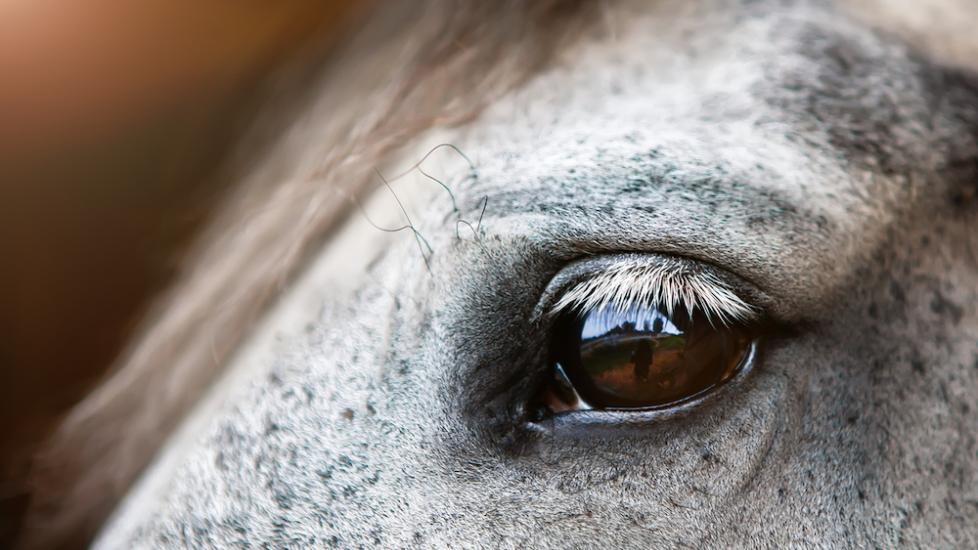Entropion in Horses
What Is Entropion in Horses?
Entropion is a condition of the horse’s eye that occurs when the edge of the eyelid rolls inward. This causes the eyelashes to contact the surface of the eye resulting in severe pain and inflammation.
Entropion most frequently occurs in newborn and very young foals. Quarter horses and Thoroughbreds are more commonly affected.
Symptoms of Entropion in Horses
Many of the symptoms of entropion are similar to those seen in other eye conditions, so it is important to consult with your veterinarian if you horse is showing any of the following symptoms:
-
Squinting
-
Tearing
-
Ocular discharge
-
Redness of the eye
-
Swelling of the eyelids
Causes of Entropion in Horses
Most cases of entropion are seen in very young foals. Entropion can be caused by either:
-
Genetic conditions
-
Dehydration and malnutrition
When it occurs in adult horses, entropion is usually secondary to another inflammatory condition or trauma of the eye. This is sometimes called spastic entropion.
How Veterinarians Diagnose Entropion in Horses
Veterinarians diagnose entropion by performing a thorough ophthalmic exam. During this exam, they will be able to confirm that the eyelid margin is rotated inward and if there are any additional concerns present such as corneal ulcers or uveitis.
Treatment of Entropion in Horses
The treatment plan for entropion will depend on the initial cause. The most important treatments are aimed at addressing the underlying causes of the entropion–if it’s due to malnourishment or an inflammatory condition.
Once any underlying cause is addressed, tacking sutures or filler injections can be used in many cases to help evert the eyelids while they slowly correct themselves. In severe congenital cases that don’t resolve on their own, eyelid surgery to shorten and turn out the eyelids can be performed.
Recovery and Management of Entropion in Horses
Recovery from most of these procedures will require topical antibiotics in the eye to prevent infection and systemic NSAIDS (phenylbutazone, Banamine) to manage pain and inflammation. It can take several weeks for resolution to occur, and it is important to work closely with your veterinarian while you monitor the healing. This will likely involve at least a few follow-up visits with your veterinarian.
It is impossible to avoid all cases of entropion, but as a horse owner, you can help prevent it in the following ways:
-
Ensure that your neonatal foal is nursing properly, is bright, and is gaining weight appropriately
-
Contact your veterinarian immediately if your horse has any signs of eye pain (squinting, tearing, redness) and be consistent with the prescribed treatment
Entropion in Horses FAQs
What happens if entropion is left untreated?
If untreated, entropion will lead to damage and scarring of the cornea. This is very painful and will eventually cause the horse to go blind. Enucleation (removal of the eye) may be required for severe cases that have gone untreated for a long time.
Does entropion in horses go away?
In many cases of congenital entropion, it can resolve on its own as the horse grows. Even in these cases, treatment is still important to prevent secondary damage to the eye. Some congenital cases will not resolve on their own, and will require surgical intervention. Entropion caused by malnourishment and inflammation will typically resolve if the underlying cause is addressed.
Is entropion in horses an emergency?
Entropion is what many veterinarians refer to as “urgent but not emergent.” This means that it should be treated as quickly as is reasonable, as it can lead to secondary damage to the eye, but it is not a life-threatening condition.
References
Henriksen, Michala de Linde. “Standing Ophthalmic Surgery—How to Perform Standing Surgery of the Periocular Region in the Field.” AAEP Proceedings, vol. 63, 2017, pp. 139–153.
Featured Image: iStock.com/Natallia Saksonova
